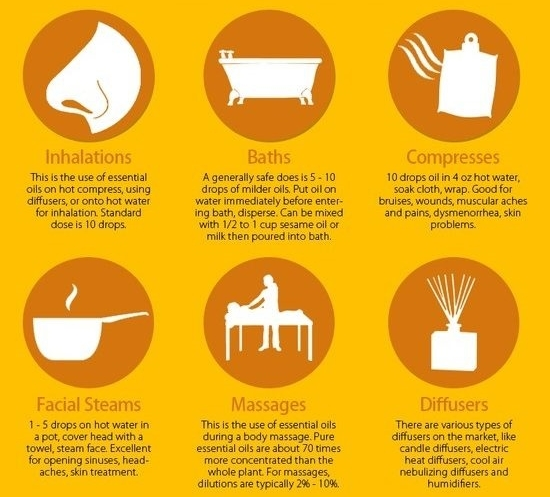
Steps to Correctly Use Essential Oils
Some people have complained to me that essential oils did not work for them during the flu season, or at other times, while not realizing that they used the same oils habitually, did not use them regularly, or used inappropriate ones.
Using essential oils correctly is key.
Here are a few tips that can make all the difference all year long.

- Do not use the same oil or combination of oils for longer than 7-10 days. The body will build a tolerance to it, thereby weakening the effects of the oils.
To avoid immunity to the essential oils, alternate single oils and combination formulas every other week. - Do not think a few applications of essential oils will boost your immune system for months to come.
Stay a step ahead and use essential oils regularly, which means daily (best) or at least 3-4x a week.
One of the best ways is to apply them undiluted to the soles of the feet at bedtime. - Do not shower for at least seven hours after applying essential oils.
- Do not assume that all essential oils fight viruses. All oils are antibacterial, but only a few possess true anti-viral properties.
- Use half the recommended amount for children, and use a carrier oil.
- Sweet Almond Oil: Mild and nourishing, helps to hydrate and soften skin
- Jojoba Oil: Similar to the natural oil our skin produces, good for balancing oily skin
- Coconut Oil: Rich and moisturizing, good for dry and sensitive skin
- Grapeseed Oil: Light and easily absorbed, good for oily and acne-prone skin
- Olive Oil: Rich in antioxidants and nutrients, good for dry and mature skin.
- V-6 Vegetable Oil Complex: is a blend of fractionated coconut oil, sesame seed oil, grape seed oil, sweet almond oil, wheat germ oil, sunflower seed oil, and extra virgin olive oil—all nourishing, antioxidant vegetable oils that are colorless and odorless and can be used to dilute essential oils and create custom blends, formulas, and massage oils.
Essential Oils for Better Immunity
Since essential oil is a plant’s own defense against disease, it does the same for us when we apply it singularly or in combination.
Using essential oils that work well with others of complementary nature is the heart of clinical aromatherapy, and this goal of synergy can yield profound results regarding the immune system.
When applied undiluted to the soles of the feet (the soft, uncalloused part between the ball of the foot and the heel), the antiviral-like properties of certain essential oils reach the bloodstream within 20 minutes and the deepest cellular level within 7-24 hours.
For the best and most reliable results, please use Young Living, the highest quality essential oils.
Immune-boosting essential oils can be your best ally throughout the year, but if you want to gear up for the flu season this winter, it is best to armor your body now while summer is still here.
Here is a list of essential oils you will want on hand and why.
- Clove: One of the most powerful and reliable essential oils in clinical aromatherapy, clove combats contagious diseases and is an excellent oil to use for any bacterial, viral, or fungal infection. Also highly recommended for Lyme disease.
- How to use:4 drops undiluted on each sole of the foot. Works even better when layered with organic lemon essential oil and used in combination 2-3x a week for 7 days. After a week, use another single oil or combination.
- Caution: Do not use undiluted on any other part of the body besides the soles of the feet. Avoid clove essential oil if you are on blood thinners
- How to use:4 drops undiluted on each sole of the foot. Works even better when layered with organic lemon essential oil and used in combination 2-3x a week for 7 days. After a week, use another single oil or combination.
- Eucalyptus globulus: Menthol-rich eucalyptus eases the pain of muscles and joints associated with influenza and strengthens the immune system to fight viruses and bacteria. It also combats infectious fevers. Eucalyptus breaks up chest congestion when diluted and applied to the chest and throat in non-asthmatics.
- How to use: A few drops added to a pot or heat-proof bowl of hot water will make wonderful steam for inflamed sinuses associated with head colds and chronic sinusitis. *Do not use Eucalyptus globulus if you have asthma. In cases of asthma, substitute with pine needle or balsam fir or pine needle.
- Lavender:Seemingly a lightweight, this essential oil is the primary oil to have on hand at home and while traveling.
- How to use: 4 drops undiluted on each sole of the foot. Works even better when layered with organic lemon essential oil and used in combination 2-3x a week for 7 days. After a week, use another single oil or combination.
- Lemon:Organic lemon essential oil is one of the most potent oils and the first to go to when one’s immunity is compromised. Organic lemon stimulates white blood cell production and boosts immunity against serious infections including pneumonia and staph.
- How to use: 4 drops undiluted on each sole of the foot. Organic lemon kills viruses and bacteria when diffused into the air via nebulizer.
- Pine Pine is good for viral fatigue and aching, winter muscles when a cold or flu is dragging you down.
- How to use: 4 drops undiluted on each sole of the foot. Best used when mixed with sea salt or Epsom salt and added to hot bath water. It can also be diluted in a little vegetable oil or unscented lotion and rubbed into the body. Pine needle is also a great oil to dilute and rub onto the chest for coughs and bronchitis.
- Tea Tree: Tea tree oil is a powerful and reliable oil for the immune system that is best when combined with organic lemon, white thyme, clove, or lavender essential oil to fight infections and the flu.
- How to use: 4 drops undiluted on each sole of the foot.
- Lemongrass: Lemongrass essential oil is used to relieve muscle pain, ward off insects, and reduce body aches. It also has powerful antimicrobial properties.
- How to use: 4 drops undiluted on each sole of the foot.
Even those oils seemingly alike, offer unique benefits.
With a little practice and even more knowledge, clinical aromatherapy can be employed to dramatically bolster immunity and guard against winter illnesses and even greater threats.
Besides using essential oils on the soles of the feet, other methods of using essential oils such as diffusing, inhalation, and topical application are beneficial as well.
A of course, it is a lovely, fragrant way to better health.















2 Comments